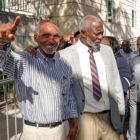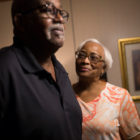
CSJ’s Founder Leonard Witt Retires
|
It’s been a week of major transitions for the Center for Sustainable Journalism (CSJ), which publishes the Juvenile Justice Information Exchange (JJIE) and Youth Today.
Juvenile Justice Information Exchange (https://jjie.org/author/jjie-org/page/25/)

It’s been a week of major transitions for the Center for Sustainable Journalism (CSJ), which publishes the Juvenile Justice Information Exchange (JJIE) and Youth Today.

One of the basic questions we must ask ourselves when considering criminal justice reform is: Do we really believe that people are redeemable? Our response drives our personal philosophies on how justice systems should look. As long as there is debate about humans’ ability to reform, we will not have agreement as a society about what constitutes justice.

In 1967, the U.S. Supreme Court ruled that children in juvenile court must receive due process protections, including the right to counsel. The case, In re Gault, which originated in Gila County, Ariz., created the foundation of juvenile defense as we know it today. No longer would children face the awesome power of the state and the prospect of losing their liberty without benefitting from “the guiding hand of counsel.”

Netflix’s highly anticipated limited series, Ava DuVernay's "When They See Us" is now out. It chronicles the story of the infamous Central Park Five case: how five teenage boys of color from Harlem were wrongly convicted of the rape of a white woman in 1989 and their 25-year fight for justice.

I’ve argued that notions demeaning the “teenage brain,” “adolescent risk,” and “crime-prone youth” are just simplistic adult prejudices with no scientific basis that hamper understanding of the root conditions and individual situations that drive challenges affecting youth. However, youths do deserve singular considerations in the justice system.

At the age of 16, A.S. had just made his high school football team when his life was upended. His mother was moving overseas, and he would have to go live with his remarried father and four step-siblings in another part of town.

Two grey-haired men listened silently in Courtroom 505 of the Duval County Courthouse on March 28 as Judge Angela M. Cox uttered the words that they’d waited the better part of 50 years to hear: “The indictments against you have been dismissed and you are free to go.”

Just two months into her term, in March 2017, the Orlando area state attorney, Aramis Ayala, made an unprecedented announcement. Standing in front of the Orange County Courthouse, a gaggle of TV microphones clipped around her podium, she stated firmly, “I will not be seeking the death penalty in cases in my office.”

The young woman sat on a mattress in the middle of the floor of her bedroom in North Baton Rouge. Open in front of her was the diary she started after her friend, Jordan Frazier, was shot and killed by a Baton Rouge Police officer during a traffic stop. The entry was dated June 27, 2017, just more than a week after his death.

Six days. That’s how long it took lawmakers in New Zealand to ban military-style assault weapons following an attack in Christchurch that left 50 people dead and injured about 50 others.